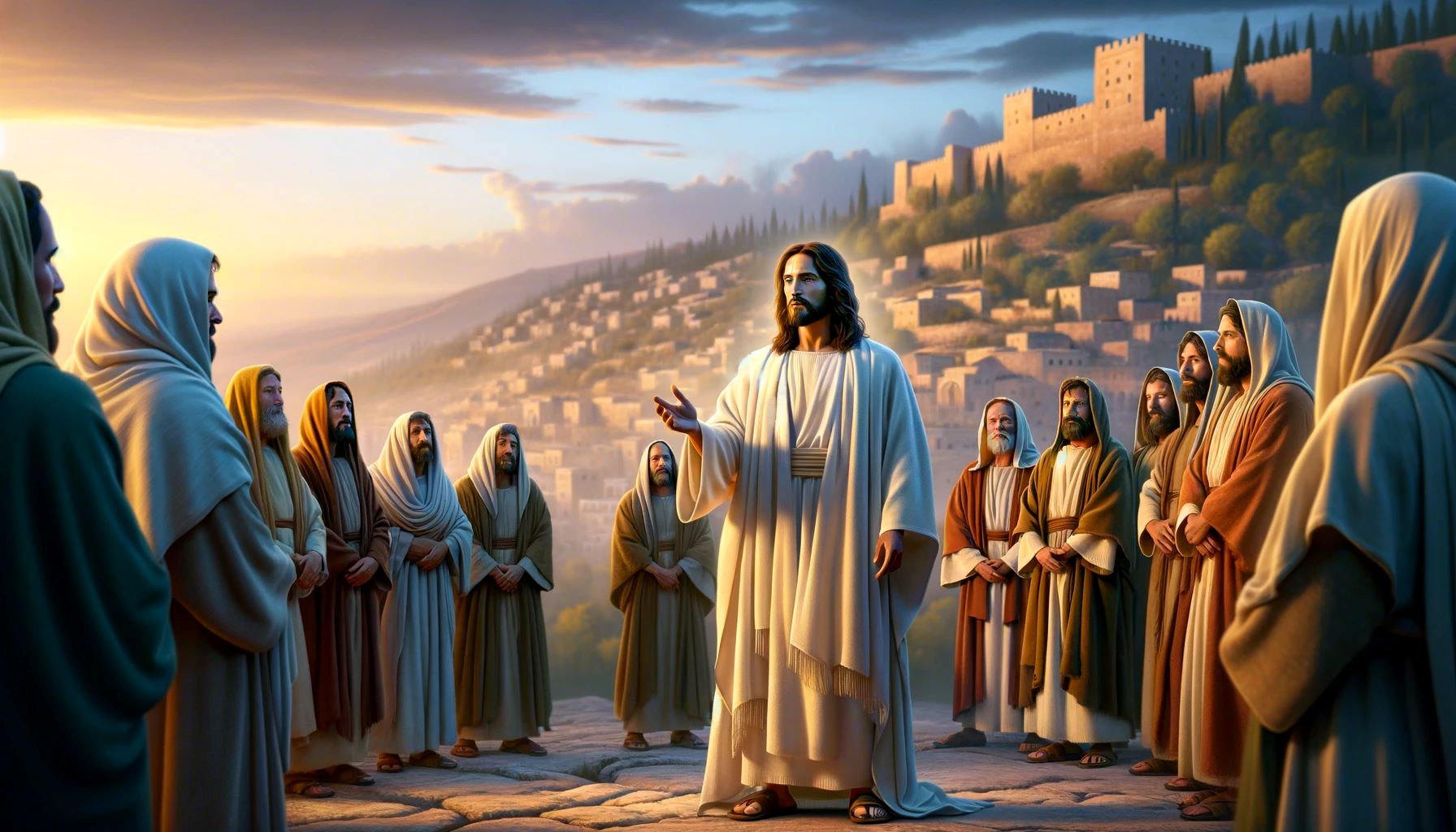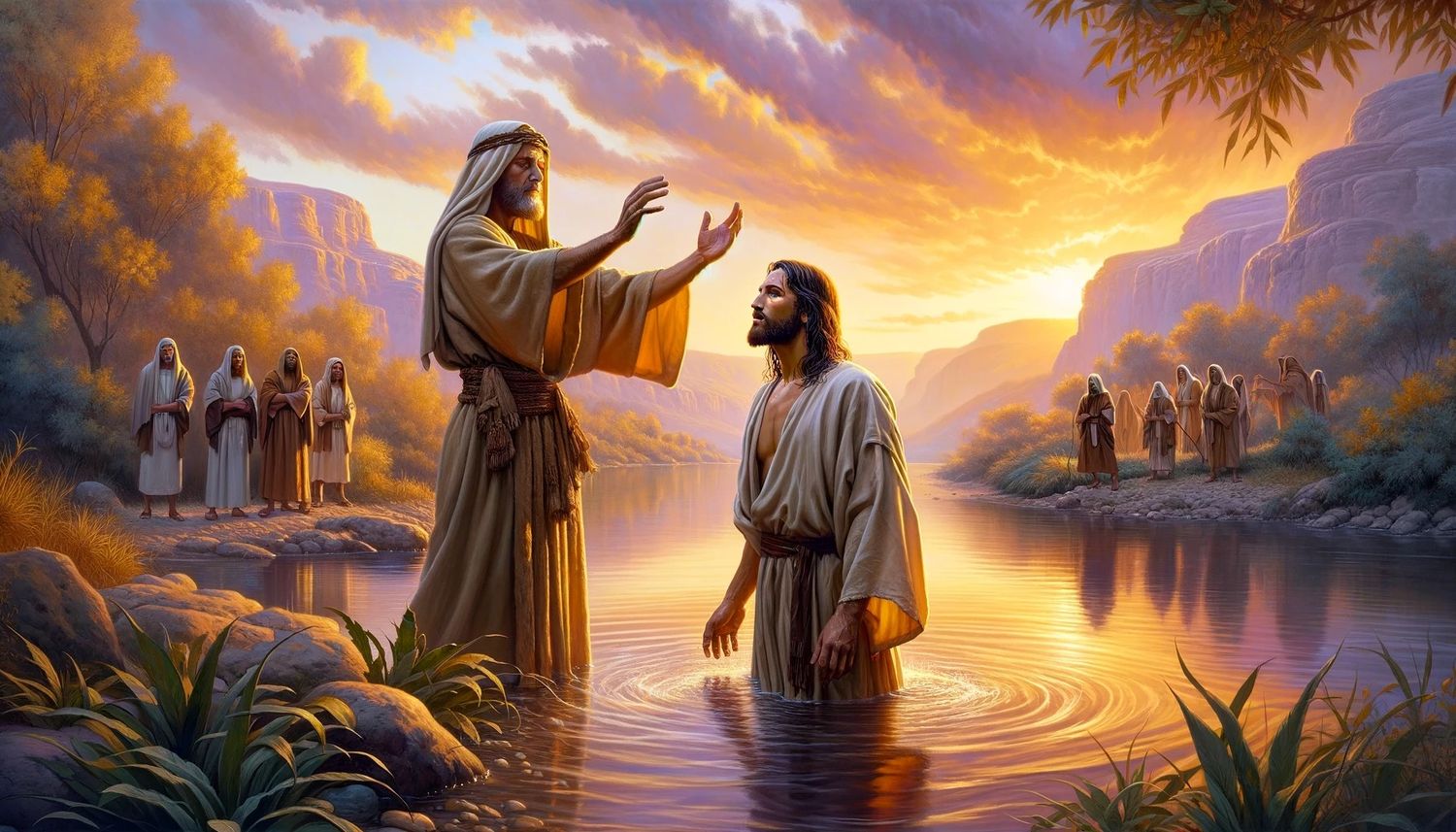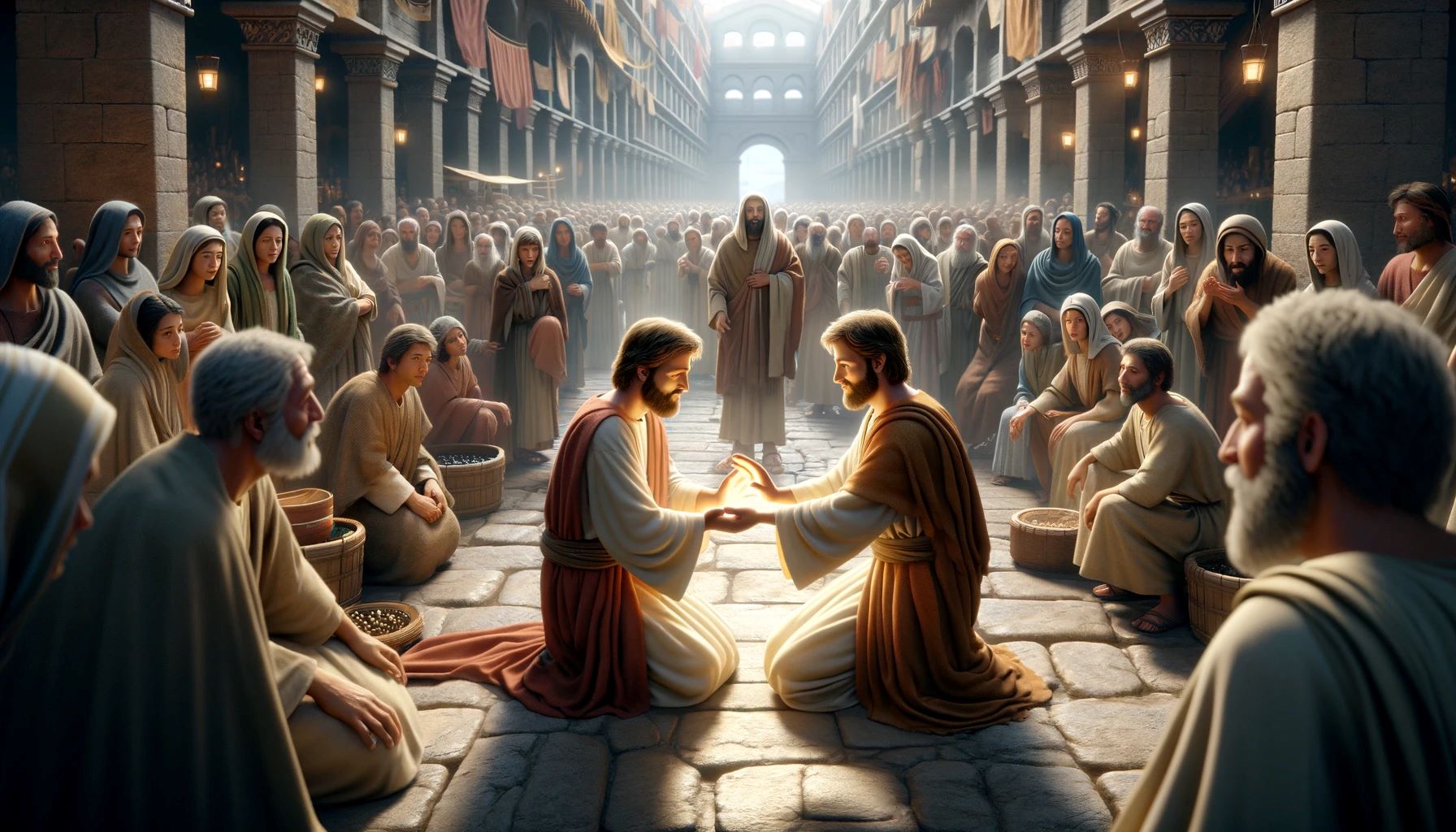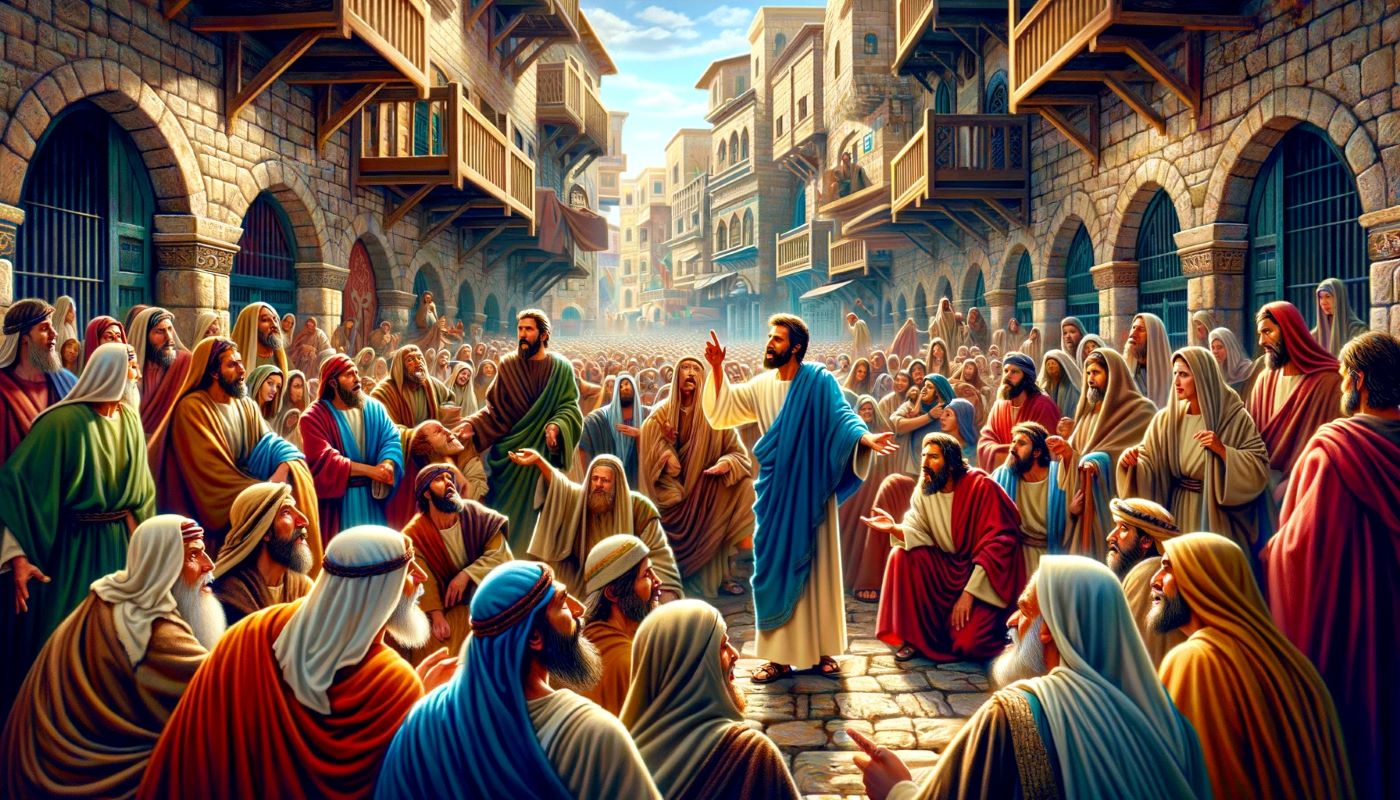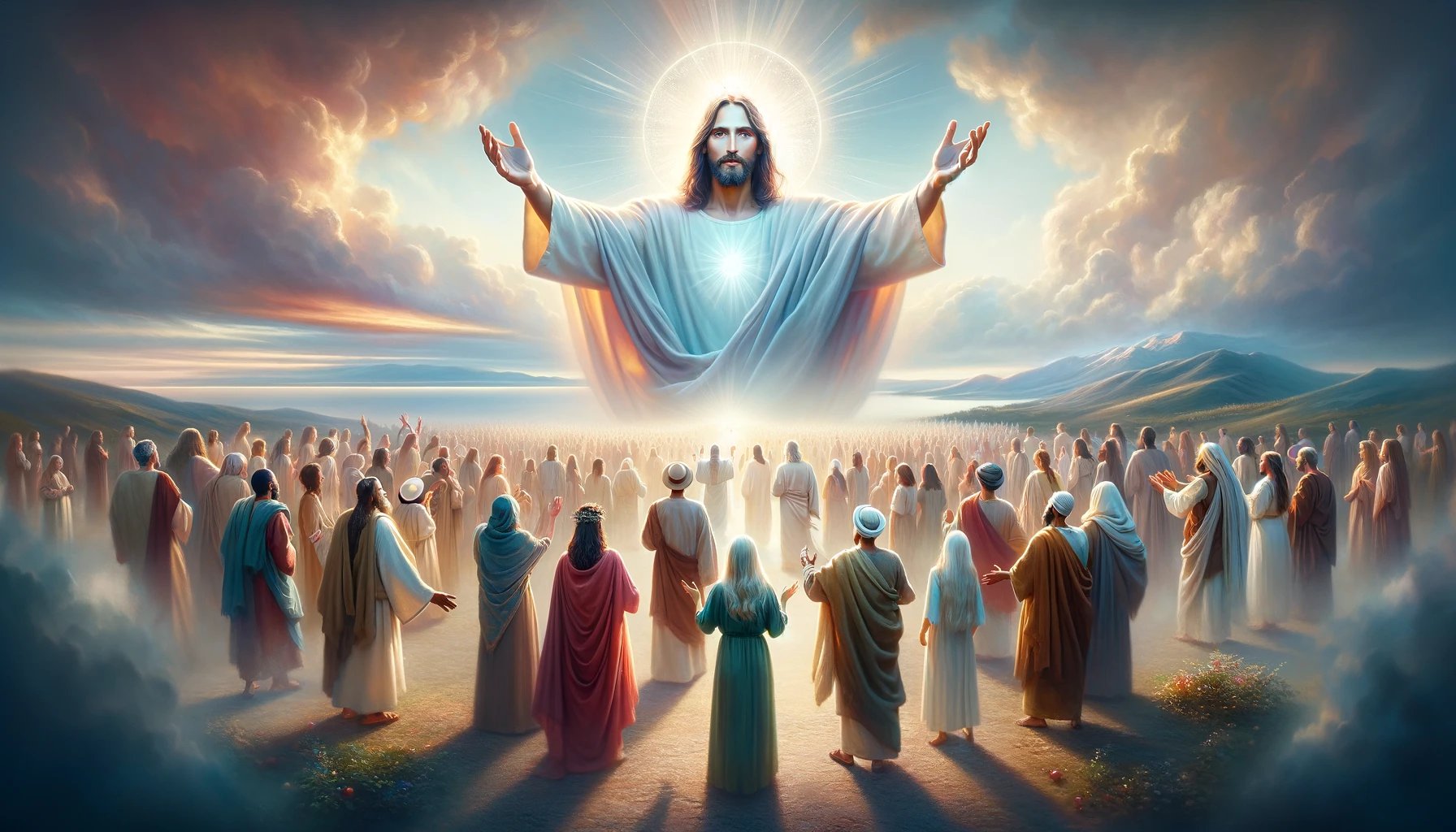Home>Theology and Spirituality>What Did Jesus Do After His Baptism


Theology and Spirituality
What Did Jesus Do After His Baptism
Published: March 2, 2024
Jason DeRose, Managing Editor at Christian.net, uses his expertise in religion and journalism to deepen understanding of faith's societal impacts. His editorial leadership, coupled with a strong academic background, enriches the platform’s diverse content, earning him recognition in both journalism and religious circles.
Discover what Jesus did after his baptism and delve into the theology and spirituality of this significant event in Christian history. Explore the impact and significance of Jesus' actions in the context of theology and spirituality.
(Many of the links in this article redirect to a specific reviewed product. Your purchase of these products through affiliate links helps to generate commission for Christian.net, at no extra cost. Learn more)
Table of Contents
The Temptation in the Wilderness
After His baptism, Jesus was led by the Spirit into the wilderness, where He fasted for forty days and forty nights. During this time, Jesus was tempted by the devil. The devil tried to tempt Jesus three times, appealing to His physical needs, His authority, and His desire for power. However, Jesus resisted each temptation by quoting scripture and reaffirming His commitment to God. This event is significant as it demonstrates Jesus' strength of character and His ability to overcome temptation, setting an example for His followers to resist evil and remain faithful to God.
-
Physical Needs: The devil tempted Jesus to turn stones into bread to satisfy His hunger. However, Jesus responded by quoting Deuteronomy 8:3, stating that "Man shall not live by bread alone, but by every word that comes from the mouth of God." This illustrates the importance of spiritual nourishment and reliance on God's word.
-
Authority: Next, the devil took Jesus to the highest point of the temple and urged Him to throw Himself down, claiming that angels would rescue Him. However, Jesus countered by quoting Deuteronomy 6:16, saying, "You shall not put the Lord your God to the test." This highlights Jesus' refusal to manipulate God's power for personal gain.
-
Desire for Power: Lastly, the devil offered Jesus all the kingdoms of the world if He would worship him. Jesus rebuked the devil, declaring, "You shall worship the Lord your God and Him only shall you serve." This emphasizes Jesus' unwavering commitment to God and rejection of worldly power and authority.
After enduring these temptations, Jesus emerged from the wilderness strengthened and prepared to begin His ministry. This event serves as a powerful example of spiritual resilience and unwavering faith, inspiring believers to rely on God's word and resist the temptations of the world.
Read more: Where Did Jesus Go After His Baptism?
Calling of the Disciples
After His baptism and the temptation in the wilderness, Jesus began to call His disciples to follow Him. The calling of the disciples marked the beginning of Jesus' ministry and the formation of His inner circle of followers. This pivotal moment demonstrated Jesus' intention to spread His message and establish a community of believers who would carry on His teachings. The calling of the disciples also exemplifies Jesus' approach to leadership, as He sought individuals who were willing to leave behind their previous lives and commit to a new path as His followers.
-
Selecting the Twelve: Jesus chose twelve men to be His closest companions and apostles, symbolizing the twelve tribes of Israel and representing a new spiritual community. Among the chosen disciples were Peter, Andrew, James, John, Philip, Bartholomew, Thomas, Matthew, James the son of Alphaeus, Thaddaeus, Simon the Zealot, and Judas Iscariot.
-
Invitation to Follow: Jesus extended a simple yet profound invitation to the prospective disciples, saying, "Follow me, and I will make you fishers of men." This call to discipleship required a willingness to abandon their previous occupations and wholeheartedly commit to learning from and following Jesus.
-
Response of the Disciples: The chosen individuals responded to Jesus' call without hesitation, leaving behind their livelihoods and families to embark on a transformative journey with Him. Their immediate response reflects the compelling nature of Jesus' message and the depth of their faith in His divine calling.
-
Formation of a Community: The calling of the disciples marked the formation of a close-knit community centered around Jesus' teachings and mission. This community would later become instrumental in spreading the message of the Gospel and establishing the early Christian church.
The calling of the disciples was a foundational moment in Jesus' ministry, signifying the beginning of a collective effort to share His message of love, redemption, and salvation. It also serves as a powerful example of the transformative impact of Jesus' invitation, inspiring believers to respond wholeheartedly to His call and become active participants in His mission.
Performing Miracles
Performing miracles was a significant aspect of Jesus' ministry, demonstrating His divine authority and compassion for those in need. These miraculous acts served as powerful manifestations of God's power and love, leaving a profound impact on those who witnessed them. Jesus' miracles encompassed various forms of healing, restoration, and supernatural interventions, showcasing His ability to bring about transformation and hope in the lives of individuals.
-
Healing the Sick: Jesus displayed remarkable compassion and healing power by curing the sick and afflicted. Countless accounts in the Gospels depict Jesus restoring sight to the blind, enabling the lame to walk, and healing individuals suffering from various ailments. These acts of healing not only alleviated physical suffering but also conveyed a message of God's mercy and the arrival of His kingdom.
-
Miraculous Feeding: One of the most well-known miracles attributed to Jesus is the feeding of the five thousand. With only a few loaves of bread and fish, Jesus miraculously provided more than enough food to satisfy the multitude of people who had gathered to hear Him teach. This extraordinary display of abundance and provision highlighted Jesus' ability to meet the needs of His followers in miraculous ways.
-
Calming the Storm: Jesus demonstrated His authority over nature by calming a raging storm while He and His disciples were at sea. His command over the elements not only saved them from peril but also revealed His divine power over creation itself. This miraculous event inspired awe and deepened the disciples' faith in Jesus' extraordinary capabilities.
-
Raising the Dead: Perhaps one of the most profound displays of Jesus' miraculous power was the raising of the dead. Accounts such as the resurrection of Lazarus exemplify Jesus' authority over death and His ability to bring forth new life. These miracles served as compelling evidence of Jesus' identity as the Son of God and the source of eternal life.
-
Demonstrating Compassion: Beyond the supernatural nature of His miracles, Jesus' acts of compassion and empathy towards those in distress were equally remarkable. His willingness to heal the marginalized, interact with the outcasts, and uplift the downtrodden reflected His deep love for all people, regardless of their social status or circumstances.
Jesus' miracles were not merely displays of power, but profound expressions of God's love and grace. They affirmed His identity as the long-awaited Messiah and offered tangible demonstrations of the kingdom of God breaking into the present reality. These miraculous acts continue to inspire faith and hope, reminding believers of the boundless possibilities that exist through a relationship with Jesus.
Teaching and Preaching
Jesus' ministry was characterized by His profound teachings and impactful preaching, which conveyed timeless truths and spiritual insights to His followers. Through His parables, sermons, and interactions with diverse audiences, Jesus imparted wisdom, challenged societal norms, and revealed the nature of God's kingdom. His teachings and preaching not only provided guidance for ethical living but also offered a vision of hope, redemption, and transformation for all who would listen.
-
Parables: Jesus often utilized parables—simple, relatable stories with profound spiritual meanings—to convey profound truths about God's kingdom. These parables addressed themes such as forgiveness, mercy, compassion, and the inclusive nature of God's love. By employing everyday scenarios and imagery, Jesus made His teachings accessible to a wide audience, inviting them to contemplate deeper spiritual realities.
-
Sermons on the Mount: One of the most renowned instances of Jesus' teaching is the Sermon on the Mount, where He delivered the Beatitudes and expounded on ethical principles that challenged conventional wisdom. In this sermon, Jesus emphasized humility, peacemaking, and righteousness, offering a radical vision for a transformed society and a renewed relationship with God.
-
Challenging Religious Hypocrisy: Jesus fearlessly confronted religious hypocrisy and legalism, advocating for genuine faith, mercy, and justice. His teachings emphasized the importance of inner righteousness and sincerity of heart, rather than mere adherence to external rituals or traditions.
-
Emphasis on Love and Compassion: Throughout His ministry, Jesus consistently emphasized the paramount importance of love for God and love for one's neighbor. His teachings on compassion, forgiveness, and selfless love challenged societal norms and inspired a new paradigm of relating to others with empathy and grace.
-
Inclusive Message: Jesus' teachings and preaching conveyed an inclusive message of salvation and redemption, extending beyond cultural and social boundaries. He welcomed the marginalized, the outcasts, and the sinners, emphasizing that God's kingdom was open to all who would repent and believe.
-
Call to Repentance and Faith: Central to Jesus' preaching was the call to repentance and faith in the arrival of God's kingdom. He urged His listeners to turn away from sin, embrace a transformed way of living, and place their trust in the redemptive work of God.
Jesus' teachings and preaching continue to resonate with believers today, offering timeless insights into the nature of God, the call to discipleship, and the principles of living a life aligned with God's will. His words challenge, inspire, and guide individuals on their spiritual journeys, inviting them to embrace a deeper understanding of God's love and the transformative power of His truth.
Last Supper and Betrayal
The Last Supper stands as a poignant and pivotal event in Jesus' ministry, serving as the setting for the institution of the Eucharist and the revelation of His impending betrayal. This significant gathering took place in the upper room of a home in Jerusalem, where Jesus shared a final meal with His disciples before His crucifixion. The Last Supper holds profound symbolism and spiritual significance, encapsulating themes of sacrifice, redemption, and the establishment of a new covenant.
Institution of the Eucharist
During the Last Supper, Jesus initiated the sacrament of the Eucharist, a sacred ritual that continues to hold central importance in Christian worship. He took bread, blessed it, and gave it to His disciples, declaring, "Take, eat; this is my body." He then took the cup, gave thanks, and offered it to them, saying, "Drink from it, all of you; for this is my blood of the covenant, which is poured out for many for the forgiveness of sins." This act of instituting the Eucharist signified the sacrificial nature of Jesus' impending death and the spiritual nourishment that believers would receive through partaking in the symbolic elements of bread and wine.
Revelation of Betrayal
Amidst the solemn atmosphere of the Last Supper, Jesus revealed that one of His disciples would betray Him. This revelation deeply troubled the disciples, prompting each of them to question whether they would be the one to betray their beloved teacher. Jesus identified Judas Iscariot as the betrayer, indicating that the one who would dip his hand into the dish with Him would betray Him. This revelation foreshadowed the events that would lead to Jesus' arrest and crucifixion, underscoring the weight of betrayal and the fulfillment of prophetic scriptures.
Symbolism of the Passover
The Last Supper coincided with the Jewish festival of Passover, a commemoration of the Israelites' liberation from slavery in Egypt. Jesus' choice of timing for this significant gathering held profound symbolism, as He imbued the traditional Passover meal with new meaning. By associating His impending sacrifice with the Passover lamb and the elements of the meal, Jesus established a connection between the deliverance of the Israelites and the redemption He would bring through His own sacrificial death.
Commemoration and Reflection
For believers, the Last Supper serves as a poignant reminder of Jesus' selfless act of love and the redemptive significance of His sacrifice. The institution of the Eucharist during this solemn occasion underscores the ongoing spiritual nourishment and communion with Christ that is extended to His followers. Additionally, the revelation of betrayal highlights the human frailty and the complex interplay of free will and divine providence within the unfolding of God's plan for salvation.
Read more: What Do You Do After Baptism
Betrayal and Arrest
Following the Last Supper, Judas Iscariot carried out his act of betrayal by identifying Jesus to the religious authorities, leading to His arrest in the Garden of Gethsemane. This act of betrayal set in motion the events that would culminate in Jesus' crucifixion, underscoring the profound impact of human choices within the overarching narrative of God's redemptive plan.
The Last Supper and the subsequent betrayal of Jesus stand as poignant and profound moments in the narrative of His ministry, encapsulating themes of sacrifice, redemption, and the establishment of a new covenant. These events continue to hold deep spiritual significance for believers, serving as a focal point for reflection, commemoration, and the affirmation of faith in the redemptive work of Christ.
